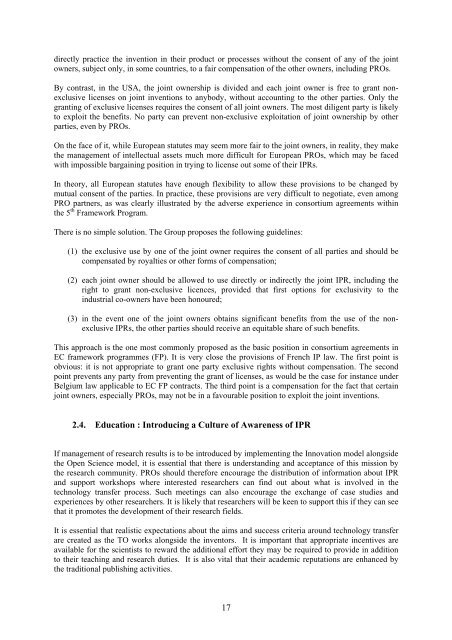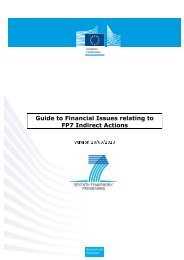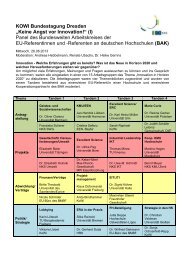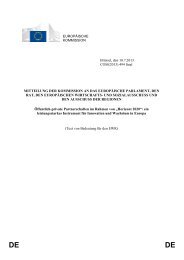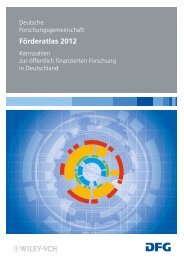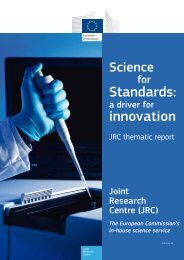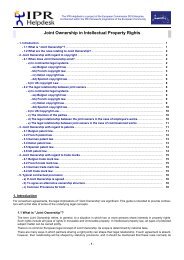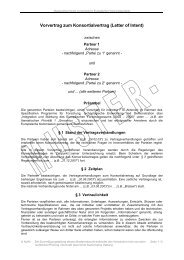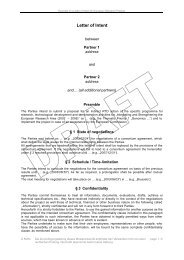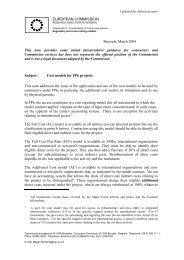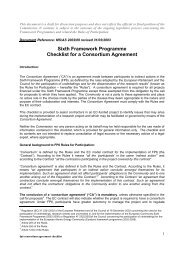Expert Group Report Management of Intellectual Property in ... - KoWi
Expert Group Report Management of Intellectual Property in ... - KoWi
Expert Group Report Management of Intellectual Property in ... - KoWi
You also want an ePaper? Increase the reach of your titles
YUMPU automatically turns print PDFs into web optimized ePapers that Google loves.
directly practice the <strong>in</strong>vention <strong>in</strong> their product or processes without the consent <strong>of</strong> any <strong>of</strong> the jo<strong>in</strong>t<br />
owners, subject only, <strong>in</strong> some countries, to a fair compensation <strong>of</strong> the other owners, <strong>in</strong>clud<strong>in</strong>g PROs.<br />
By contrast, <strong>in</strong> the USA, the jo<strong>in</strong>t ownership is divided and each jo<strong>in</strong>t owner is free to grant nonexclusive<br />
licenses on jo<strong>in</strong>t <strong>in</strong>ventions to anybody, without account<strong>in</strong>g to the other parties. Only the<br />
grant<strong>in</strong>g <strong>of</strong> exclusive licenses requires the consent <strong>of</strong> all jo<strong>in</strong>t owners. The most diligent party is likely<br />
to exploit the benefits. No party can prevent non-exclusive exploitation <strong>of</strong> jo<strong>in</strong>t ownership by other<br />
parties, even by PROs.<br />
On the face <strong>of</strong> it, while European statutes may seem more fair to the jo<strong>in</strong>t owners, <strong>in</strong> reality, they make<br />
the management <strong>of</strong> <strong>in</strong>tellectual assets much more difficult for European PROs, which may be faced<br />
with impossible barga<strong>in</strong><strong>in</strong>g position <strong>in</strong> try<strong>in</strong>g to license out some <strong>of</strong> their IPRs.<br />
In theory, all European statutes have enough flexibility to allow these provisions to be changed by<br />
mutual consent <strong>of</strong> the parties. In practice, these provisions are very difficult to negotiate, even among<br />
PRO partners, as was clearly illustrated by the adverse experience <strong>in</strong> consortium agreements with<strong>in</strong><br />
the 5 th Framework Program.<br />
There is no simple solution. The <strong>Group</strong> proposes the follow<strong>in</strong>g guidel<strong>in</strong>es:<br />
(1) the exclusive use by one <strong>of</strong> the jo<strong>in</strong>t owner requires the consent <strong>of</strong> all parties and should be<br />
compensated by royalties or other forms <strong>of</strong> compensation;<br />
(2) each jo<strong>in</strong>t owner should be allowed to use directly or <strong>in</strong>directly the jo<strong>in</strong>t IPR, <strong>in</strong>clud<strong>in</strong>g the<br />
right to grant non-exclusive licences, provided that first options for exclusivity to the<br />
<strong>in</strong>dustrial co-owners have been honoured;<br />
(3) <strong>in</strong> the event one <strong>of</strong> the jo<strong>in</strong>t owners obta<strong>in</strong>s significant benefits from the use <strong>of</strong> the nonexclusive<br />
IPRs, the other parties should receive an equitable share <strong>of</strong> such benefits.<br />
This approach is the one most commonly proposed as the basic position <strong>in</strong> consortium agreements <strong>in</strong><br />
EC framework programmes (FP). It is very close the provisions <strong>of</strong> French IP law. The first po<strong>in</strong>t is<br />
obvious: it is not appropriate to grant one party exclusive rights without compensation. The second<br />
po<strong>in</strong>t prevents any party from prevent<strong>in</strong>g the grant <strong>of</strong> licenses, as would be the case for <strong>in</strong>stance under<br />
Belgium law applicable to EC FP contracts. The third po<strong>in</strong>t is a compensation for the fact that certa<strong>in</strong><br />
jo<strong>in</strong>t owners, especially PROs, may not be <strong>in</strong> a favourable position to exploit the jo<strong>in</strong>t <strong>in</strong>ventions.<br />
2.4. Education : Introduc<strong>in</strong>g a Culture <strong>of</strong> Awareness <strong>of</strong> IPR<br />
If management <strong>of</strong> research results is to be <strong>in</strong>troduced by implement<strong>in</strong>g the Innovation model alongside<br />
the Open Science model, it is essential that there is understand<strong>in</strong>g and acceptance <strong>of</strong> this mission by<br />
the research community. PROs should therefore encourage the distribution <strong>of</strong> <strong>in</strong>formation about IPR<br />
and support workshops where <strong>in</strong>terested researchers can f<strong>in</strong>d out about what is <strong>in</strong>volved <strong>in</strong> the<br />
technology transfer process. Such meet<strong>in</strong>gs can also encourage the exchange <strong>of</strong> case studies and<br />
experiences by other researchers. It is likely that researchers will be keen to support this if they can see<br />
that it promotes the development <strong>of</strong> their research fields.<br />
It is essential that realistic expectations about the aims and success criteria around technology transfer<br />
are created as the TO works alongside the <strong>in</strong>ventors. It is important that appropriate <strong>in</strong>centives are<br />
available for the scientists to reward the additional effort they may be required to provide <strong>in</strong> addition<br />
to their teach<strong>in</strong>g and research duties. It is also vital that their academic reputations are enhanced by<br />
the traditional publish<strong>in</strong>g activities.<br />
17


